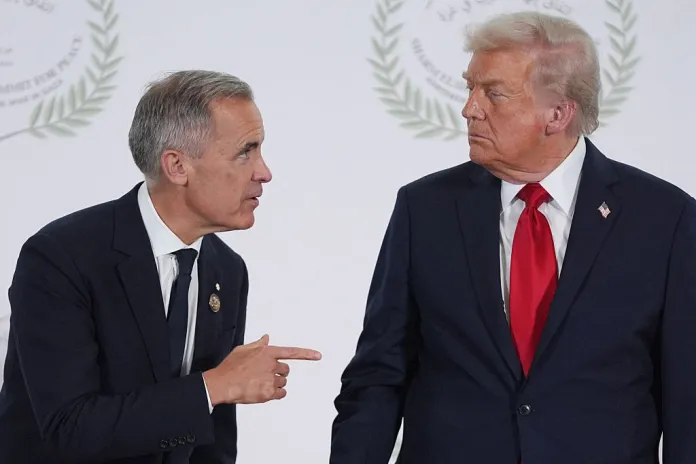President Donald Trump is cutting U.S. tariffs on China by 10% while raising them against Canada by the same amount. Once again, the message goes out that it is more expensive to be America’s friend than its opponent.
Canadians know it. After a year of annexation threats and aggressive tariffs, 46% say they see the United States as a “potential threat” or an “enemy.” Only 34% say the same about China.
Other U.S. allies are going through a similar recalibration. I wrote here the other day about how the territorial claims on Greenland have helped push Iceland into reopening the issue of European Union membership. Vietnam is cozying up to China, and even Taiwan is readier to negotiate with its old foe. South Korea’s new president made his first visit, not to the U.S., but to Japan. Only Britain still remains a more or less committed ally, and even there, talk is turning to replacing the current American-built nuclear deterrent with a wholly independent missile capacity, along the lines of the French system.
I realize that there is limited mileage in appealing to America’s old alliance system. I believe it undergirded the most prosperous era our species has ever known. The position of the U.S. as the wealthiest and strongest nation on Earth was guaranteed, the reserve status of the dollar was an invaluable asset for successive administrations, and, as a bonus, other countries also got richer. Whenever I advance that case, though, I am piranha-shoaled by angry MAGA activists telling me that the U.S. should not care about other countries, that Canada has no more claim on American goodwill than Cameroon, that it’s America First.

So, rather than trying to convince you that picking fights with traditional allies at precisely the moment when China is bidding for global hegemony may be a mistake, let me instead make a domestic argument.
The U.S. was founded in a popular revolt against taxation, arbitrary government, and an over-mighty executive. Now, as it approaches its 250th birthday, it is embracing those things with a keenness that George III never matched.
That dull, well-meaning king did not have, and never sought, the power to levy tariffs or other taxes without parliamentary approval. His foreign policy was not ruled by pique or petulance. Indeed, for all the exaggerated fears about his plans to create a monarchical dictatorship, he never behaved as Trump is behaving toward Canada.
What, after all, did the Big Dominion do to prompt Trump’s anger? Did it threaten to withhold its energy exports, or close the Northwest Passage to American shipping, or blockade the tiny exclave of Point Roberts? No. All it did — and by “it” I mean the provincial government of Ontario — was to air a 1988 broadcast by Ronald Reagan.
It was a well-chosen speech for our time. “When someone says, ‘Let’s impose tariffs on foreign imports,’ it looks like they’re doing the patriotic thing by protecting American products and jobs. And sometimes, for a short while, it works — but only for a short time,” the Gipper said. “What eventually occurs is: first, homegrown industries start relying on government protection in the form of high tariffs. They stop competing and stop making the innovative management and technological changes they need to succeed in world markets.”
Spot on. For Trump to react so hysterically to these words is telling — a bit like Hamlet’s father rushing out when he sees the reenactment of how he murdered his brother. As always, we have since watched the painful contortions of people and organizations who should know better, trying to justify the president’s tantrum.
POST-KIRK AUTHORITARIANISM REACHES ENGLAND
“The ad misrepresents the Presidential Radio Address, and the Government of Ontario did not seek or receive permission to use and edit the remarks,” said the Ronald Reagan Presidential Foundation and Institute. No, it did not misrepresent the great man, who was a committed free trader and who had repeated those sentiments many times. True, it put one passage in a different place, but this was done to match the images on screen, and in no sense distorted the meaning. Anyway, since when did we need permission to quote politicians?
The foundational ideas of the republic — no kings, a government of laws not of men, no taxation without representation — are being trampled, and no one seems to care. It is not so much a case of becoming more like China in order to compete with China. It is a case of becoming more like China in order to wallop Canada. When did that become OK?
